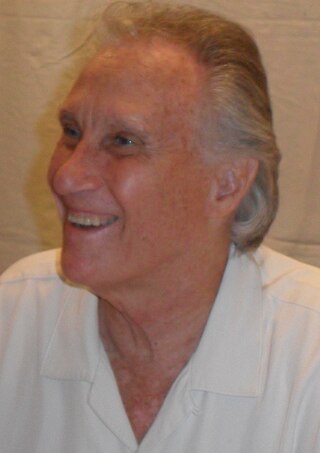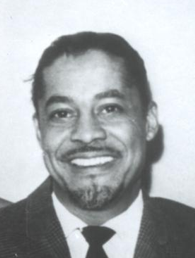Related Research Articles

The Righteous Brothers are an American musical duo originally formed by Bill Medley and Bobby Hatfield but now comprising Medley and Bucky Heard. Medley formed the group with Hatfield in 1963. They had first performed together in 1962 in the Los Angeles area as part of a five-member group called the Paramours, and adopted the name The Righteous Brothers when they became a duo. Their most active recording period was in the 1960s and '70s, and, after several years inactive as a duo, Hatfield and Medley reunited in 1981 and continued to perform until Hatfield's death in 2003. The term "blue-eyed soul" is thought to have first been coined by Philadelphia radio DJ Georgie Woods in 1964 when describing the duo's music.

Barry Eugene Carter, better known by his stage name Barry White, was an American singer and songwriter. A two-time Grammy Award winner known for his bass voice and romantic image, his greatest success came in the 1970s as a solo singer and with the Love Unlimited Orchestra, crafting many enduring soul, funk, and disco songs such as his two biggest hits: "Can't Get Enough of Your Love, Babe" and "You're the First, the Last, My Everything".

Robert Lee Hatfield was an American singer. He and Bill Medley were the Righteous Brothers. He sang the tenor part for the duo and sang solo on the group's 1965 recording of "Unchained Melody".
Billy Vera is an American singer, songwriter, actor, author, and music historian. He has been a singer and songwriter since the 1960s, his most successful record being "At This Moment", a US number 1 hit in 1987. He continues to perform with his group Billy Vera & The Beaters and won a Grammy Award in 2013.
Sue Records was also the name of a Louisiana-based record company which owned Jewel Records.
Robert James Byrd, known by the stage name Bobby Day, was an American singer, multi-instrumentalist, music producer, and songwriter. He is best known for his hit record "Rockin' Robin", written by Leon René under the pseudonym Jimmie Thomas. Day also wrote the top-10 Billboard hits "Little Bitty Pretty One" and "Over and Over".

"Harlem Shuffle" is an R&B song written and originally recorded by the duo Bob & Earl in 1963. The song describes a dance called the “Harlem Shuffle”, and mentions several other contemporary dances of the early 1960s, including the Monkey Shine, the Limbo, the Hitch hike, the Slide, and the Pony.

William Thomas Medley is an American singer best known as one-half of The Righteous Brothers. He is noted for his bass-baritone voice, exemplified in songs such as "You've Lost That Lovin' Feelin'". Medley produced a number of the duo's songs, including "Unchained Melody" and "(You're My) Soul and Inspiration".

"Slow Down" is the debut single of American singer Bobby Valentino, released from his first self-titled album, Bobby Valentino, on February 14, 2005. Produced by Tim & Bob, the song spent four consecutive weeks at number one on the US Billboard Hot R&B/Hip-Hop Songs chart and has since been certified gold by the Recording Industry Association of America (RIAA). "Slow Down" also peaked at number eight on the Billboard Hot 100 as well as number four in the United Kingdom. The music video was directed by Erik White.
Gwen McCrae is an American singer, best known for her 1975 hit "Rockin' Chair".

Ernest Aaron Freeman was an American pianist, organist, bandleader, and arranger. He was responsible for arranging many successful rhythm and blues and pop records from the 1950s to the 1970s.

Tim & Bob, also known as Funktwons, were an American songwriting and production duo from Peoria, Illinois. The duo has been credited on the Billboard Hot 100 top ten-singles "Thong Song" for Sisqó, "Slow Down" for Bobby V, "They Don't Know" for Jon B., and the top 40-singles "So Into You" for Tamia and "Come See Me" for 112. They discovered the latter act in Atlanta during the late 1990s, and worked extensively with artists Bobby V, Boyz II Men, Donell Jones and Monica to produce one or more of their albums, respectively. They disbanded in 2014 to separately pursue solo work.
The Hollywood Flames were an American R&B vocal group in the 1950s, best known for their No. 11 hit "Buzz-Buzz-Buzz" in 1957.
The Valentinos was an American family R&B group from Cleveland, Ohio, best known for launching the careers of brothers Bobby Womack and Cecil Womack. Bobby went on to find greater fame as a solo artist while Cecil became successful as a member of the husband and wife duo of Womack & Womack with Linda Cooke. The group was well known for R&B hits such as the original versions of "Lookin' for a Love", notably covered by the J. Geils Band and later a solo hit for Bobby Womack, and "It's All Over Now", covered by the Rolling Stones.
Robert Nelson Relf was an American R&B and soul musician. Best known as half of the soul music duo Bob & Earl whose song, Harlem Shuffle was released in the US in 1963 and in the UK in 1964. It was re-released 1969 reaching No 7 in the UK charts. Relf's recording of the song "Blowing My Mind to Pieces" was written by Lou Barreto as well as being produced by Lou Barreto and Rod Bumgardner. The song became popular on the Northern soul scene in the UK in the 1970s.

The Singles 1971–2006 is a box set compilation of singles by The Rolling Stones spanning the years 1971 to 2006. It covers their output with both Rolling Stones Records and Virgin Records labels.

Live at the Tokyo Dome is a live album by the Rolling Stones, released in 2012. It was recorded at the Tokyo Dome in Japan in 1990. The album was released exclusively as a digital download through Google Music on 10 July 2012, and subsequently on the Stones Archive Store on 11 July 2012.
Fred Sledge Smith, often credited as Fred Smith, was an American R&B songwriter and record producer, who worked in particular with The Olympics, Bob & Earl, Bill Cosby, and the Watts 103rd Street Rhythm Band.
Earl Lee Nelson, who also performed as Jackie Lee, was an American soul singer and songwriter. He started his career in the doo-wop group the Hollywood Flames in the 1950s before founding the R&B duo Bob & Earl with Bobby Byrd. As Jackie Lee, he's best known for his hit song "The Duck".

John Edward Beland is an American songwriter, session guitarist, recording artist, producer and author. Beland's career as guitarist started out in Los Angeles in the late 1960s, playing sessions and local live gigs with Kris Kristofferson, as well as future Eagles members, Glenn Frey and Bernie Leadon. Beland's first major break came in 1970, when he played lead guitar for a young Linda Ronstadt. He helped Ronstadt put together her first serious solo band, Swampwater. Along with bandmates Gib Guilbeau, Thad Maxwell and Stan Pratt, Swampwater toured the country with Ronstadt, appearing with her on many notable television shows including The Johnny Cash Show. Swampwater recorded two landmark country-rock albums for Starday-King and RCA Records. The group was one of the first Los Angeles bands to record in Nashville, known for their smooth harmonies and Cajun rock style.
References
- 1 2 3 4 5 6 7 8 Colin Larkin, ed. (1997). The Virgin Encyclopedia of Popular Music (Concise ed.). Virgin Books. p. 158. ISBN 1-85227-745-9.
- ↑ Eder, Bruce. "Biography". AllMusic . Retrieved June 13, 2022.
- ↑ White, Barry (June 1, 1995). "Telephone interview with Larry Katz". The Katz Tapes. Archived from the original on July 4, 2022. Retrieved June 4, 2015.
- ↑ Nelson, Valerie J. (July 25, 2008). "'Harlem Shuffle' co-writer was part of the soul duo Bob & Earl". Los Angeles Times . Archived from the original on September 24, 2008. Retrieved January 16, 2016.
- ↑ "The Times & The Sunday Times". The Times. December 14, 2007. Archived from the original on July 24, 2008. Retrieved June 15, 2017.
- ↑ "Earl Nelson". Rockabillyeurope.com. Archived from the original on September 8, 2006. Retrieved June 15, 2017.
- ↑ "Signings". Billboard. November 7, 1964. p. 10.
- ↑ "I've Got So Much to Give – Barry White | Songs, Reviews, Credits". AllMusic . Retrieved October 17, 2019.
- ↑ "Bob & Earl Top Songs / Chart Singles Discography". Music VF. Retrieved June 13, 2022.
- ↑ "BOB & EARL - full Official Chart History". Official Charts Company . Retrieved June 13, 2022.